One poster in a recently discovered trove vilifies the Nazis with a sword through a Bible and the words "This Is the Enemy." Some encouraged self-sacrifice by promoting recycling, planting gardens and buying potatoes. Still others warned that loose lips can literally sink ships and get American soldiers killed.
This stash of 190 propaganda posters from World War I and World War II were found last year on top of two sawhorses in the basement of a Rochester, New Hampshire, library. Fragile but mostly in good condition, the posters offer viewers a glimpse of what life was like during war time and the extent that the American government went to maintain support for the conflict by playing on fear, patriotism and civic duty.
Click to Gallery
One poster in a recently discovered trove vilifies the Nazis with a sword through a Bible and the words "This Is the Enemy." Some encouraged self-sacrifice by promoting recycling, planting gardens and buying potatoes. Still others warned that loose lips can literally sink ships and get American soldiers killed.
"Most of them were about supporting the military," he said. "I would call that the main theme. Patriotism. Purchasing war bonds, growing a victory garden, being in support of rationing all that stuff. There is a neat one that has all these pictures of bombs and stuff. The way the artist drew it is there is a skillet at the top dumping out waste fat. That was used for munitions."
The best posters look like something painted by Norman Rockwell, with one for war bonds featuring children holding an American flag and another with a nurse watching over a soldier with his eyes bandaged and the words "Carry On." On the flip side, a poster has darker images of Nazis burning books and the words "Books cannot be killed by fire." Another plays on the enemy-in-our midst theme and features a soldier floundering at sea with the words "Someone talked."
"Regardless the type of regime, the type of nation involved, propaganda is designed to rally people toward something and make people hate something," he said. "It's meant to divide the world into the people you want to be part of, the people who are opposed to you."
Sylvester said the library has no plans in the near future to display the posters. There are concerns that sunlight would cause the colors to fade. Instead, they have photographed all the posters and are showing them on a computer in the library. They are also planning to host an expert from the Wright Museum of World War II history for a Nov. 29 lecture on the power of war posters.
The exterior of the Rochester Public Library in Rochester, N.H., Thursday, Nov. 8, 2018. A trove of propaganda posters from World War I and II were found recently found after being lost in storage for decades in the library's basement. (AP PhotoCharles Krupa)
"Some of these are really neat," library director Brian Sylvester said as he thumbed through the posters.
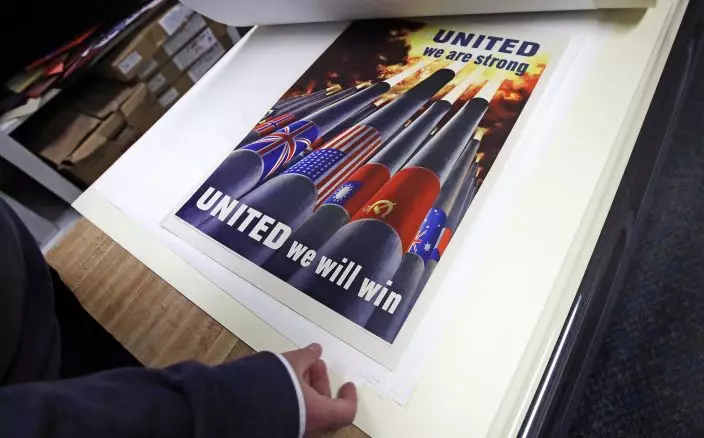
Brian Sylvester, director of the Rochester Public Library, examines original war posters at the library's archive in Rochester, N.H., Thursday, Nov. 8, 2018. A trove of propaganda posters from World War I and II were found recently found after being lost in storage for decades in the library's basement. (AP PhotoCharles Krupa)
"Most of them were about supporting the military," he said. "I would call that the main theme. Patriotism. Purchasing war bonds, growing a victory garden, being in support of rationing all that stuff. There is a neat one that has all these pictures of bombs and stuff. The way the artist drew it is there is a skillet at the top dumping out waste fat. That was used for munitions."
Sylvester said it is unclear how the posters ended up in the library's basement, but the themes give some clues that they were likely there for decades. About 50 posters dating back to World War I championed the American Red Cross, which kept its records at the library. Dozens more promoted war bonds, while two dozen highlighted a World War I program in which libraries collected books to be sent to troops overseas.
Many more look like big post cards, promoting tourist destinations in Britain or featuring a portrait of a soldier from an allied country — China, the Netherlands and even Ethiopia.
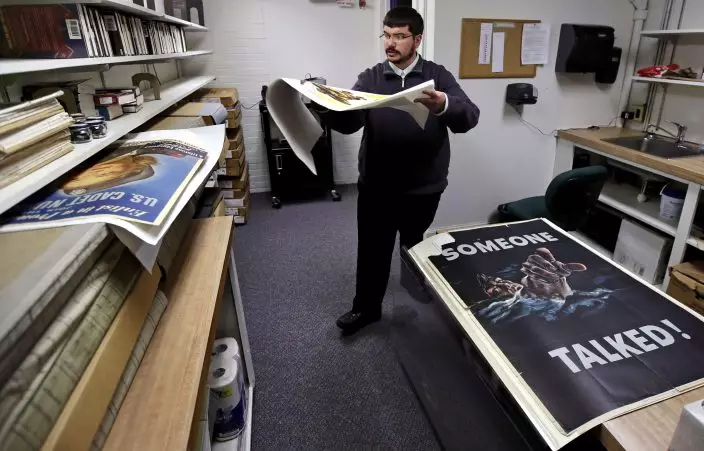
Brian Sylvester, director of the Rochester Public Library, carries an original war poster at the library's archive in Rochester, N.H., Thursday, Nov. 8, 2018. A trove of propaganda posters from World War I and II were found recently found after being lost in storage for decades in the library's basement. (AP PhotoCharles Krupa)
The best posters look like something painted by Norman Rockwell, with one for war bonds featuring children holding an American flag and another with a nurse watching over a soldier with his eyes bandaged and the words "Carry On." On the flip side, a poster has darker images of Nazis burning books and the words "Books cannot be killed by fire." Another plays on the enemy-in-our midst theme and features a soldier floundering at sea with the words "Someone talked."
"The posters are almost a lost art form," Sylvester said. "People don't do this to try and spread this kind of message anymore. These are such simple messages. It's just really laid on thick."
Benjamin Weiss, director of collections at Boston's Museum of Fine Arts who curated its current exhibit on 175 propaganda postcards from the 1920s, 1930s and 1940s, said certain themes stand out in these kinds of messages.
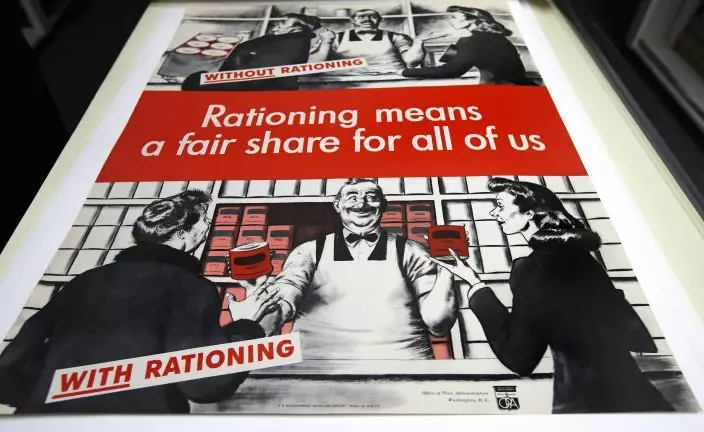
An original Office of Price Administration rationing poster is shown from the archive at the Rochester Public Library in Rochester, N.H., Thursday, Nov. 8, 2018. A trove of propaganda posters from World War I and II were found recently found after being lost in storage for decades in the library's basement. (AP PhotoCharles Krupa)
"Regardless the type of regime, the type of nation involved, propaganda is designed to rally people toward something and make people hate something," he said. "It's meant to divide the world into the people you want to be part of, the people who are opposed to you."
Though he hadn't heard about the New Hampshire posters, Weiss said they also illustrate the power of propaganda with a focus on national themes.
"That is a key piece of this which is they showed up in Rochester, New Hampshire but they could just as easily of been in Rochester, New York or Rochester, Minnesota," he said. "These were things that were created, in most cases, probably at a central point with the idea they are going to reach the whole country and address the whole country."
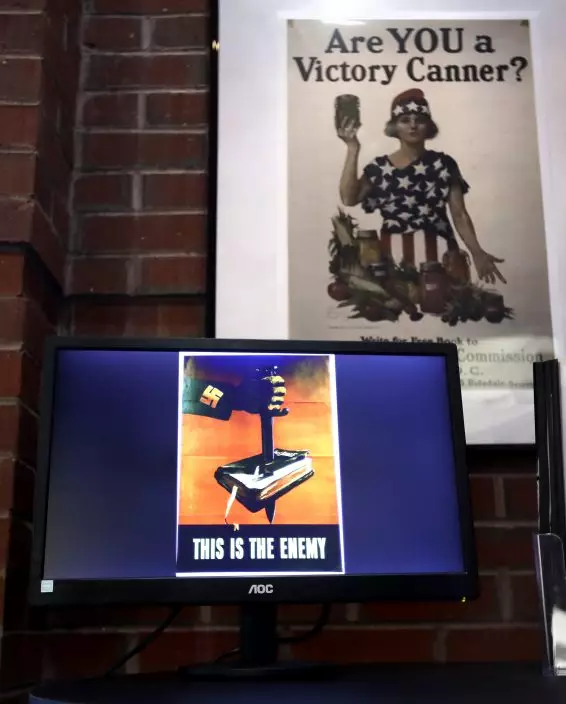
A National War Garden Commission poster copy hangs in a hallway as a display loop shows historic posters on monitor at the Rochester Public Library in Rochester, N.H., Thursday, Nov. 8, 2018. A trove of propaganda posters from World War I and II were found recently found after being lost in storage for decades in the library's basement. (AP PhotoCharles Krupa)
Sylvester said the library has no plans in the near future to display the posters. There are concerns that sunlight would cause the colors to fade. Instead, they have photographed all the posters and are showing them on a computer in the library. They are also planning to host an expert from the Wright Museum of World War II history for a Nov. 29 lecture on the power of war posters.
"For me personally, it kind of gave me an awareness that libraries played a role in those wars," Sylvester said, adding they eventually hope to get the UV-protected glass and acid-free matting needed to display the original posters.
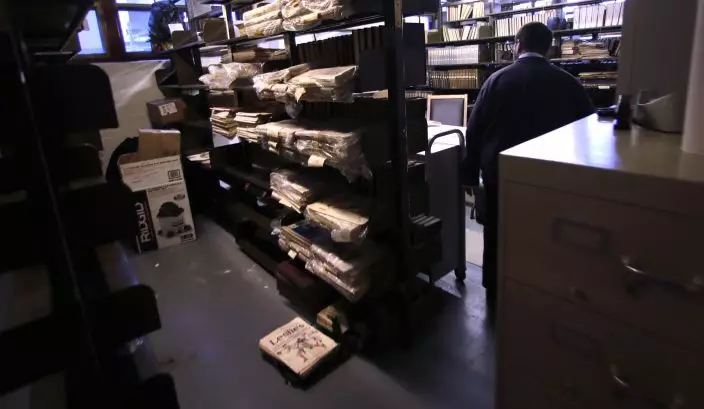
Brian Sylvester, director of the Rochester Public Library, walks through the library's storage and archive area in Rochester, N.H., Thursday, Nov. 8, 2018. A trove of propaganda posters from World War I and II were found recently found after being lost in storage for decades in the library's basement. (AP PhotoCharles Krupa)

The exterior of the Rochester Public Library in Rochester, N.H., Thursday, Nov. 8, 2018. A trove of propaganda posters from World War I and II were found recently found after being lost in storage for decades in the library's basement. (AP PhotoCharles Krupa)
UNITED NATIONS (AP) — Russia on Wednesday vetoed a U.N. resolution sponsored by the United States and Japan calling on all nations to prevent a dangerous nuclear arms race in outer space, calling it “a dirty spectacle” that cherry picks weapons of mass destruction from all other weapons that should also be banned.
The vote in the 15-member Security Council was 13 in favor, Russia opposed and China abstaining.
The resolution would have called on all countries not to develop or deploy nuclear arms or other weapons of mass destruction in space, as banned under a 1967 international treaty that included the U.S. and Russia, and to agree to the need to verify compliance.
U.S. Ambassador Linda Thomas-Greenfield said after the vote that Russian President Vladimir Putin has said Moscow has no intention of deploying nuclear weapons in space.
“Today’s veto begs the question: Why? Why, if you are following the rules, would you not support a resolution that reaffirms them? What could you possibly be hiding,” she asked. “It’s baffling. And it’s a shame.”
Russia’s U.N. Ambassador Vassily Nebenzia dismissed the resolution as “absolutely absurd and politicized,” and said it didn’t go far enough in banning all types of weapons in space.
Russia and China proposed an amendment to the U.S.-Japan draft that would call on all countries, especially those with major space capabilities, “to prevent for all time the placement of weapons in outer space, and the threat of use of force in outer spaces.”
The vote was 7 countries in favor, 7 against, and one abstention and the amendment was defeated because it failed to get the minimum 9 “yes” votes required for adoption.
The U.S. opposed the amendment, and after the vote Nebenzia addressed the U.S. ambassador saying: “We want a ban on the placement of weapons of any kind in outer space, not just WMDs (weapons of mass destruction). But you don’t want that. And let me ask you that very same question. Why?”
He said much of the U.S. and Japan’s actions become clear “if we recall that the U.S. and their allies announced some time ago plans to place weapons … in outer space.”
Nebenzia accused the U.S. of blocking a Russian-Chinese proposal since 2008 for a treaty against putting weapons in outer space.
Thomas-Greenfield accused Russia of undermining global treaties to prevent the spread of nuclear weapons, irresponsibly invoking “dangerous nuclear rhetoric,” walking away from several of its arms control obligations, and refusing to engage “in substantive discussions around arms control or risk reduction.”
She called Wednesday’s vote “a real missed opportunity to rebuild much-needed trust in existing arms control obligations.”
Thomas-Greenfield’s announcement of the resolution on March 18 followed White House confirmation in February that Russia has obtained a “troubling” anti-satellite weapon capability, although such a weapon is not operational yet.
Putin declared later that Moscow has no intention of deploying nuclear weapons in space, claiming that the country has only developed space capabilities similar to those of the U.S.
Thomas-Greenfield said before the vote that the world is just beginning to understand “the catastrophic ramifications of a nuclear explosion in space.”
It could destroy “thousands of satellites operated by countries and companies around the world — and wipe out the vital communications, scientific, meteorological, agricultural, commercial, and national security services we all depend on,” she said.
The defeated draft resolution said “the prevention of an arms race in outer space would avert a grave danger for international peace and security.” It would have urged all countries carrying out activities in exploring and using outer space to comply with international law and the U.N. Charter.
The draft would have affirmed that countries that ratified the 1967 Outer Space Treaty must comply with their obligations not to put in orbit around the Earth “any objects” with weapons of mass destruction, or install them “on celestial bodies, or station such weapons in outer space.”
The treaty, ratified by some 114 countries, including the U.S. and Russia, prohibits the deployment of “nuclear weapons or any other kinds of weapons of mass destruction” in orbit or the stationing of “weapons in outer space in any other manner.”
The draft resolution emphasized “the necessity of further measures, including political commitments and legally binding instruments, with appropriate and effective provisions for verification, to prevent an arms race in outer space in all its aspects.”
It reiterated that the U.N. Conference on Disarmament, based in Geneva, has the primary responsibility to negotiate agreements on preventing an arms race in outer space.
The 65-nation body has achieved few results and has largely devolved into a venue for countries to voice criticism of others’ weapons programs or defend their own. The draft resolution would have urged the conference “to adopt and implement a balanced and comprehensive program of work.”
At the March council meeting where the U.S.-Japan initiative was launched, U.N. Secretary-General António Guterres warned that “geopolitical tensions and mistrust have escalated the risk of nuclear warfare to its highest point in decades.”
He said the movie “Oppenheimer” about Robert Oppenheimer, who directed the U.S. project during World War II that developed the atomic bomb, “brought the harsh reality of nuclear doomsday to vivid life for millions around the world.”
“Humanity cannot survive a sequel to Oppenheimer,” the U.N. chief said.

United States Ambassador and Representative to the United Nations Linda Thomas-Greenfield addresses members of the U.N. Security Council before voting during a meeting on Non-proliferation of nuclear weapons, Wednesday, April 24, 2024 at United Nations headquarters. (AP Photo/Eduardo Munoz Alvarez)

FILE - U.S. Ambassador to United Nations Linda Thomas-Greenfield speaks on Thursday, April 18, 2024, in Tokyo. The U.N. Security Council is set to vote Wednesday, April 24, 2024, on a resolution announced by Thomas-Greenfield, calling on all nations to prevent a dangerous nuclear arms race in outer space. It is likely to be vetoed by Russia. (AP Photo/Eugene Hoshiko, Pool, File)

















